rape

ST. LOUIS — Kristen Leslie began her 2003 book, When Violence Is No Stranger, with a verse from Psalms, a nod to her training as a theologian.
“It is not enemies who taunt me — I could bear that; it is not adversaries who deal insolently with me — I could hide from them. But it is you, my equal, my companion, my familiar friend…”
The book’s subject was acquaintance rape, and it got the attention of a chaplain at the Air Force Academy. The school was then reeling from a Pentagon report indicating that 7 percent of its cadets reported being the victims of rape or attempted rape. Nearly 90 percent of the perpetrators were their own classmates.
Leslie, now a professor of pastoral theology and care at Eden Theological Seminary in Webster Groves, Mo., was invited to Colorado to consult with academy leaders on how to train Air Force chaplains to deal with sexualized violence on campus.
Now, a decade later, the U.S. Navy has come knocking.
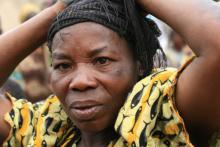
I can still see in my mind’s eye the vibrantly colored wraps draping the hundreds of displaced women I met at Joborona Camp in Northern Sudan. The stories they told, of blazing huts in Southern Sudan and their men burning alive inside; of their boys forced to fight and kill at ages as young as six or seven; and of their girls taken and forced into sexual slavery seemed impossible to be true. Yet I heard them again and again.
And if these stories weren’t horrific enough, it was the stories the women chose not to share that haunt me the most. Their empty eyes and void expressions told me all I needed to know.
I know empty eyes. I have gazed into them in Bosnia and Croatia. I remember Rwanda, Sierra Leone, and Liberia. I have witnessed them in the Democratic Republic of the Congo — where it is believed that one million girls and women have stories to tell of the gender-based violence they have endured. I have been confronted by the eyes of our sisters from Darfur, who risk their dignity, their bodies, and in some cases their very lives by leaving their refugee camps to collect firewood for their small cooking stoves (those who are lucky enough to have one). It is in the bush, often, that they are victims of sexual and gender-based violence. These are the countless women who risk being raped so their children can eat.

We have learned from the crisis at Penn State University and other incidents that have gained national attention that it is not only religious authorities that turn a blind eye to abuses of power. The educational, legal, social service, and policing systems are broken when it comes to protecting children, and others who are vulnerable, from abuse.
Lest we forget our history and think that this is a uniquely 20th and 21st century problem, we need only turn to the Bible. In II Samuel, we are reminded that abuses of power, lust, and rage have always been part of the human experience.
An incident described II Samuel happens not in a religious or educational institution but in a family. It is not an isolated incident; it does not develop out of thin air. It is a case of “like father, like son.” Amnon’s father is King David, who in II Samuel 11, sees Bathsheba bathing and uses his power to have her brought to him so that he may “lay” with her.
It is only two chapters later that we read that Amnon, David’s son, is tormented by the beauty of his half-sister, Tamar. Amnon does not have the authority that his father David has, so he must use trickery instead of sheer power to get what he wants. After Amnon violently “lays” with Tamar, he is filled with hatred for her and forces her to leave his sight. In doing this, he shames her even further.
The scandal is not just that Amnon violates Tamar and the law of Israel, but when Tamar cries and ritually mourns her pain and disgrace she is told to be quiet. Her brother Absalom tells her to stop brooding over the episode. And while Absalom and their father, King David, are angry with Amnon for what he has done to Tamar, neither David nor Absalom even talks to Amnon about it. David does not punish his beloved firstborn son.
Perhaps one positive thing we can say about this story is that Tamar has a name; she is not anonymous like so many other powerless women in biblical stories. Tamar is named and remembered.

Editor’s Note: As we continue reporting on the important topic of sexual abuse and violence, Sojourners has opened up the Sexual Violence and the Church blog series for submissions. This piece is one such submission. If you are interested in submitting a post for the series, please email the Web Editor HERE.
I know now, what I wish I knew then. Only after speaking up, did I learn how common stories like mine are to women across the globe. I know the warning signs and have a clearer picture of what is and isn’t acceptable behavior. I long for each of us to wrestle with the truth that we are never to blame — no matter how we dress, what we look like, or how much we’ve had to drink.
We never, ever deserve to have our bodies treated as objects of shame.

Violence against women is the most prevalent and the most hidden injustice in our world today. From rape as a weapon of war, to human trafficking, to the attack of a young girl seeking an education, the treatment of women and girls across the globe is in a state of crisis.
And we don't even need to leave our own shores to encounter staggering statistics. Here in the U.S., 1 in 5 women have been raped in their lifetime — a number that only jumps when you realize that 54 percent of sexual assaults are never reported. More than 1 in 3 women have experienced some kind of intimate partner violence. Sexual assaults in the U.S. military continue to rise — with an estimated 26,000 in 2012 alone — even as its leaders claim to be addressing the epidemic.
As I lay out in my book On God’s Side, what has been missing from this narrative is the condemnation of these behaviors from other men, especially men in positions of power, authority, and influence — like those in our pulpits. In a section of that book, I say we need to establish a firm principle: the abuse of women by men will no longer be tolerated by other men. The voices of more men need to join the chorus to make that perfectly clear.
It's time for all people of faith to be outraged.

Every family involved, every neighbor, even those of us who look on in horror, will be forever stained by this horrific, sustained act. If any human act warrants eternal punishment, this clearly does. As much as I consider the death penalty barbaric, in this case death seems far too merciful. The perpetrator will never breathe a single breath free of shame and disgrace. The sin, by any standard, is beyond the pale. The case makes me wonder what judgement, punishment, and mercy might even mean. And like everyone else, my first impulse is to put as much distance as I can between this ‘sin’ and my own.
But we lie to ourselves if we imagine that our sin is no less ugly in the eyes of God. Is my, or your sin, really so different?

Last week, a member of my youth group texted me this picture of a pregnant Kim Kardashian. It’s a recent cover from Star Magazine. She added these sarcastic words:
What? How dare she gain weight while carrying another person in her stomach!
My heart broke. We have a big problem of objectifying women in our culture. I’d just written about the Steubenville rape case and the need to finally answer the ancient question “Am I my brother and sister’s keeper?” with a definitive yes. Rape is an extreme and obvious example of the objectification and violence against women.
But what about the cover of a magazine whose central thesis is: OMG, a pregnant person gains weight?

The tragedy of the Steubenville rape case has provided a moral challenge to our nation. We are caught up in a highly emotional cycle of blame as we debate who the real victim is in this case. I find myself asking two questions: Why is our nation obsessed with the story and what does this story mean for us as individuals and as a culture?
My Family
I’ve always wanted a daughter. The problem is that adult Ericksen dudes tend to produce baby Ericksen dudes. My dad has 4 siblings — all brothers. I have mostly male cousins. So, when my wife and I started having children … yep … two dudes.
My Church Family
I’ve been a youth pastor for about six years, and for a long time I thought the closest I’d ever get to having a daughter was to pseudo-adopt the girls in my youth group. Actually, they first pseudo-adopted me by claiming me as their “Father” on Facebook. (Hey, it’s on Facebook, so my pseudo-fatherhood status is legit.) As something of father figure for these teenage girls, each youth group session I discussed with young women and men how the Christian faith is leading us into patterns of love and non-violence. Frequently after our sessions, one of my pseudo-daughters will tell me she’s dating a boy. So, of course, after teaching them about non-violence, I say to each of them with a straight face:
If he ever touches you, I will personally kick his ass.

It’s easy to look at the now-infamous Steubenville case and see a Penn State writ small — a story of rape in the social-media age. What’s harder to see in Steubenville is ourselves. Yet the moral confusion of witnesses who prevented drunk friends from driving while permitting the assault on a teenage girl too drunk to resist or consent to sex cannot be understood apart from our widespread mockery of sexual restraint.
Self-control gets no respect in the bedroom. Hold back the passions deemed healthy and good? At best you’re quaint and immature, at worst repressed and puritanical. And don’t you dare suggest that possibly a little restraint might benefit those just becoming aware of their newly adult bodies. How dare anyone presume to limit another’s freedom, especially their sexual freedom?
Except in pockets of religious devotion, that’s the prevailing cultural sentiment toward sex and self-control in this country. And we don’t just defend our individual bodily freedom against almost any call to limits; we don’t even seem to believe you can control such desires.
So of course the 40-year-old virgin happened accidentally. It’s virtually a movie cliché that any deliberately chaste character will soon get his or her sexual comeuppance, as seduction or human nature eventually trumps principle.
And therein lies the problem.
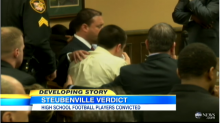
(Note: This post contains some frank and graphic discussions of sex and sexuality.)
Two boys from a Steubenville Ohio high school (I’ve opted not to use their names, though they are readily publicized by other media) have been sentenced to time in a juvenile detention center for the rape of a 16-year-old classmate who was reportedly so drunk at a party that she could no longer stand on her own. Aside from “digitally” raping the girl with their hands, reportedly multiple times, one of the boys took photos of the girl without her clothes, shared them via social media, and both young men bragged about the incident to their social networks following the incident.
As the father of both a boy and a girl, I was particularly angered and disturbed by this story. The very fact that such things happen in a supposedly civil society is a stark reminder that we have only a tenuous hold on the well-being of our kids once they leave our sight. We can only hope and pray that we’ve empowered them with the sense of autonomy, respect, compassion, and restraint to keep them either from becoming victims of such violations, or perhaps even perpetrators of it themselves.
But once I get beyond my initial feelings about the whole situation, I’m left wrestling with a number of questions that still feel terribly unresolved.
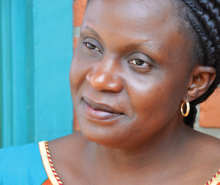
THE DEATH OF a college student who had been gang-raped in Delhi provoked outrage and anger. More than 2 million Indian students joined a movement to protest the rising violence against women in India. According to official data, reported cases of rape have more than doubled in the past 20 years, and women are the victims of a high proportion of other violent crimes.
But there's another side to this story. "Almost as shocking as the Delhi gang rape has been the range of voices that have sounded after it," wrote Sagarika Ghose, a TV journalist and commentator. "Patriarchy is chillingly omnipresent." Rather than blaming those who attack women, leaders in some Indian villages blame Westernization, liberal consumerism, growing individualism, or even the women themselves—because they wear "skimpy clothes," talk on mobile phones, and work outside the home, according to South Africa's Mail & Guardian newspaper.
For 19-year-old Kanika Sharma, these leaders miss the point. "It is all about the mentality of the boys," Sharma told the Mail & Guardian. "They think because they are men, they can do anything. But girls should get equal rights and opportunities."
Sharma speaks while standing under a sign that says: Being a woman should not make you feel vulnerable. But sadly, throughout the world women do feel vulnerable.
Before I traveled to the Democratic Republic of Congo (DRC)—described as the "rape capital" of the world—I studied reports on rape as a weapon of war. In the DRC rebel soldiers have brutally raped thousands of women. They know that if they rape enough women and girls, they can destroy the social fabric of an entire community.
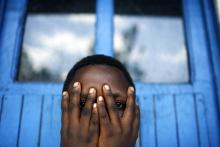
March 8 was designated as International Women’s Day by the United Nations in 1975. While the world has seen significant progress in rights and empowerment for women and girls, sexual and gender-based violence still touches every part of the globe and is tragically widespread in some areas. Women in the Democratic Republic of Congo face shockingly high rates of rape, including reports of mass rapes by soldiers, especially in the conflict-ridden province of Kivu. One Christian hospital, operated by the Free Methodist Church in the Nundu mission, works to treat injured women and heal psychological trauma.
Grace (not her real name) had spent the day working in the fields near her home in Kivu Province in the Democratic Republic of Congo (DRC). The 42-year-old mother was walking home with her two daughters, ages 20 and 16, when they were stopped by a group of 15 uniformed men. All three of the women were raped by the men and left with horrible injuries. They were brought to the Nundu Hospital, operated by the Free Methodist Church, where they received medical and psychological treatment for four weeks.
The Nundu Hospital identified 1754 survivors of sexual violence in 2012, and all but 98 of those were women or girls, according to Dr. Lubunga Eoba Samy, medical coordinator for the Free Methodist Church and coordinator of the hospital’s Sexual and Gender-Based Violence Project. This project aims to reduce the occurrence of sexual violence by promoting human rights, raising awareness and strengthening the capacity of community-based organizations to address the issue. It also includes training of local authorities and improving coordination among local non-governmental organizations.

As much as we like to believe we live in a safe country for women, we know this is not the case. Women and girls across the country are subject to rape, abuse, intimidation, and sex trafficking, with the number of victims growing each day.
Progress has been made over the past decades, thanks in part to the Violence Against Women Act. This policy protects women by providing everything from funding for rape crisis centers to increased collaboration with law enforcement to hold perpetrators accountable. VAWA is our country’s promise to women and girls that we will not allow them to be violated and abused.
The Violence Against Women Act is up for a vote in the Senate next week, and Americans from every corner of the country are calling our policymakers to reauthorize this important legislation. Since it was first passed in 1994, VAWA has received strong bipartisan support and shown its effectiveness in making communities safer, healthier, and better stewards of their resources (in the first 6 years since it was introduced, VAWA saved communities $12.6 billion).
VAWA expired in 2011, and has yet to be reauthorized.

WASHINGTON — Standing before the throngs at the March for Life on Jan. 25, Ryan Bomberger admitted that he was the poster child for one of the most difficult aspects of the abortion debate: his mother had been raped.
“I’m the fringe case that even pro-lifers have a hard time embracing,” said Bomberger, an anti-abortion activist whose mother chose to continue the pregnancy and put him up for adoption.
Forty years after the Roe v. Wade decision legalized abortion, children who were conceived through rape — and women who were raped and chose to end the pregnancy — are speaking out, opening a new front in the often-fraught discussions of a decades-old culture war.

Everyone in the political sphere, on cable television, and most certainly in Washington, D.C., has only one thing on the mind pre-Christmas, and it isn’t the fat guy in the red suit (and/or Jesus). It’s the fiscal cliff.
And while it’s an incredibly important — and incredibly complex — debate, it’s not the only one worth having right now.
There’s this other thing — this thing that has been happening on a bipartisan basis for eighteen years — that is sitting in the House of Representatives right now while our national confidence in Congress sits at about 6 percent, and our senators are filibustering their own bills. It’s the Violence Against Women Act. This seemingly procedural piece of legislation — which usually is reauthorized without question whenever it comes up — is in danger of expiring if the House doesn’t act before the end of session.
“This should not be controversial. This is something that should be capable of passing on a voice vote,” Sen. Claire McCaskill (D – Mo.) said on Wednesday at a panel discussion on the women’s vote.
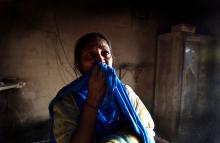
When the United States dropped atomic bombs on the Japanese cities of Hiroshima and Nagasaki in 1945, the world was ushered into a period of weapons paranoia. The Cold War, of course, was hallmarked by the obsessive weapons one-upmanship of the United States and the Soviet Union.
Who, then, would have thought that in the 21st century, the seeming weapon of choice would not be some sort of super-nuclear missile or an ultra-deadly biological toxin, but that it would, instead, be women?
“Women are being used as weapons of terror,” Dr. Rubina Greenwood told an audience last week at a congressional briefing on the rights of minority women in Pakistan organized by the Hindu American Foundation.
"From a scientific standpoint, what's legitimate and fair to say is that a woman who is raped has the same chances of getting pregnant as a woman who engaged in consensual intercourse during the same time in her menstrual cycle," said Dr. Barbara Levy, vice president for health policy at the American Congress of Obstetricians and Gynecologists.
One widely accepted study suggests a 5 percent pregnancy rate following rape, resulting in 32,000 pregnancies each year.
The report was from the Medical University of South Carolina and was published in the American Journal of Obstetrics and Gynecology and cited by the U.S. Centers for Disease Control and Prevention.
But placing an exact figure on post-rape pregnancy is problematic, primarily because rape is thought to be underreported. Another factor is the availability of over-the-counter emergency contraception, which can prevent fertilization when taken after intercourse.
One study from the journal Human Nature in 2003 suggests pregnancy rates are higher after a rape when compared with consensual sex because of the inconsistency of birth control use.
“It isn’t enough to talk about peace. One must believe in it. And it isn’t enough to believe in it. One must work at it.” –Eleanor Roosevelt, First Lady of the United States from 1933-45
“If we just sat with crossed arms, what would happen then?” is the question Denise, a Congolese civil rights attorney, asks us.
She has seen the destruction of her home through natural disaster and the pain of thousands of Congolese women who are raped every year. Still, she is faithful with the calling that she has been given—working to prosecute the cases she can to help rape survivors seek justice and find the hope to continue on.
Denise knows that to make peace, it is necessary to restrain and often punish the evil that humans do to one another.
“The Bible takes evil seriously and clearly says that evildoers should be held accountable for their deeds, and that the state has the legitimate role of bringing to justice those who perpetrate terrible crimes,” writes Jim Wallis in a July 2011 Sojourners’ column, “The Things That Make For Peace.”
But Denise’s work does not focus just on the punishment of those who commit rape but on the restoration of the survivors.

Men and women in the military face numerous challenges when they return from combat—whether post-traumatic stress disorder, economic struggles, traumatic brain injury. A glimpse at the headlines tells us the grim statistics of active-duty suicides tied to these issues.
But a new film, The Invisible War, brings to light another staggering reality: a female soldier in a combat zone is more likely to be raped by another soldier than killed in enemy fire.
The Invisible War, which opens in some markets on June 22, takes on the military culture that has failed to address the problem.
Filmmakers Kirby Dick and Amy Ziering collected stories from sexual assault survivors across the country and show how hauntingly similar their the accounts are—from harassment to assault to lack of follow-up, and for some, blatant cover up. The powerful documentary pairs the survivors’ heartbreaking stories with alarming statistics illustrating the scope of the epidemic.
According to the Department of Defense, service members reported nearly 3,200 incidents of sexual assault in 2011.

They call it the field de calzon — the "field of panties" —because so many rapes happen there.
On Wednesday, the organization Human Rights Watch released the report Cultivating Fear: The Vulnerability of Immigrant Farmworkers in the US to Sexual Violence and Sexual Harassment. It’s filled with tales that would make Jeremiah, or Amos, or Micah weep: stories of some of the most marginalized, exploited, and impoverished people in the country.
HRW talked to 160 farmworkers, growers, law enforcement officials, attorneys and other experts in agricultural workplace issues in 8 different states, finding that most women working in agriculture have been — or know someone who has been — victimized sexually at work; confirming the findings of a 2010 survey of California Central Valley workers in which 80 percent reported having experienced sexual harassment or abuse on the job.
It’s common enough that some women farm workers see it as “an unavoidable condition of agricultural work.”